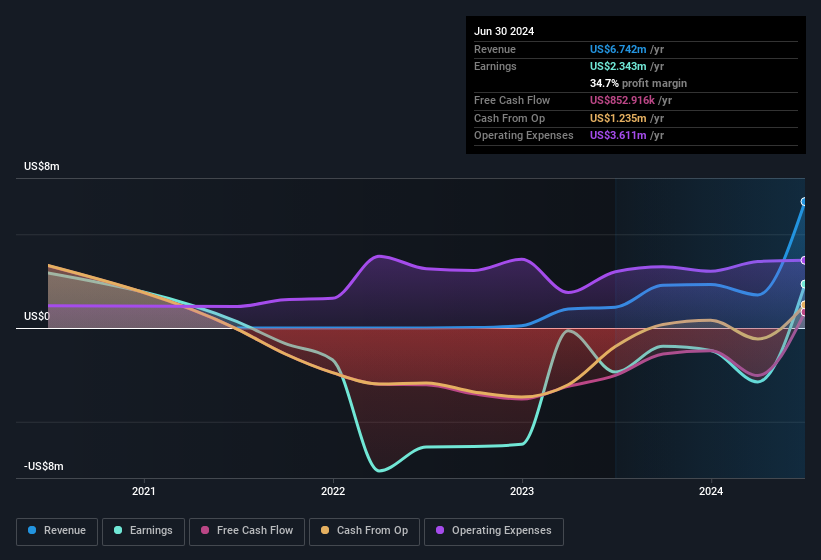- Canada
- /
- Renewable Energy
- /
- TSXV:REVV
ReVolve Renewable Power's (CVE:REVV) Earnings Are Weaker Than They Seem
ReVolve Renewable Power Corp. (CVE:REVV) announced strong profits, but the stock was stagnant. Our analysis suggests that this might be because shareholders have noticed some concerning underlying factors.
See our latest analysis for ReVolve Renewable Power

Examining Cashflow Against ReVolve Renewable Power's Earnings
One key financial ratio used to measure how well a company converts its profit to free cash flow (FCF) is the accrual ratio. In plain english, this ratio subtracts FCF from net profit, and divides that number by the company's average operating assets over that period. This ratio tells us how much of a company's profit is not backed by free cashflow.
As a result, a negative accrual ratio is a positive for the company, and a positive accrual ratio is a negative. While having an accrual ratio above zero is of little concern, we do think it's worth noting when a company has a relatively high accrual ratio. To quote a 2014 paper by Lewellen and Resutek, "firms with higher accruals tend to be less profitable in the future".
ReVolve Renewable Power has an accrual ratio of 0.21 for the year to June 2024. Unfortunately, that means its free cash flow fell significantly short of its reported profits. Indeed, in the last twelve months it reported free cash flow of US$853k, which is significantly less than its profit of US$2.34m. Notably, ReVolve Renewable Power had negative free cash flow last year, so the US$853k it produced this year was a welcome improvement. Unfortunately for shareholders, the company has also been issuing new shares, diluting their share of future earnings.
Note: we always recommend investors check balance sheet strength. Click here to be taken to our balance sheet analysis of ReVolve Renewable Power.
One essential aspect of assessing earnings quality is to look at how much a company is diluting shareholders. In fact, ReVolve Renewable Power increased the number of shares on issue by 15% over the last twelve months by issuing new shares. As a result, its net income is now split between a greater number of shares. To talk about net income, without noticing earnings per share, is to be distracted by the big numbers while ignoring the smaller numbers that talk to per share value. Check out ReVolve Renewable Power's historical EPS growth by clicking on this link.
A Look At The Impact Of ReVolve Renewable Power's Dilution On Its Earnings Per Share (EPS)
Unfortunately, we don't have any visibility into its profits three years back, because we lack the data. And even focusing only on the last twelve months, we don't have a meaningful growth rate because it made a loss a year ago, too. But mathematics aside, it is always good to see when a formerly unprofitable business come good (though we accept profit would have been higher if dilution had not been required). So you can see that the dilution has had a bit of an impact on shareholders.
In the long term, if ReVolve Renewable Power's earnings per share can increase, then the share price should too. However, if its profit increases while its earnings per share stay flat (or even fall) then shareholders might not see much benefit. For that reason, you could say that EPS is more important that net income in the long run, assuming the goal is to assess whether a company's share price might grow.
Our Take On ReVolve Renewable Power's Profit Performance
In conclusion, ReVolve Renewable Power has weak cashflow relative to earnings, which indicates lower quality earnings, and the dilution means that shareholders now own a smaller proportion of the company (assuming they maintained the same number of shares). Considering all this we'd argue ReVolve Renewable Power's profits probably give an overly generous impression of its sustainable level of profitability. If you want to do dive deeper into ReVolve Renewable Power, you'd also look into what risks it is currently facing. For instance, we've identified 5 warning signs for ReVolve Renewable Power (2 are a bit unpleasant) you should be familiar with.
Our examination of ReVolve Renewable Power has focussed on certain factors that can make its earnings look better than they are. And, on that basis, we are somewhat skeptical. But there is always more to discover if you are capable of focussing your mind on minutiae. Some people consider a high return on equity to be a good sign of a quality business. So you may wish to see this free collection of companies boasting high return on equity, or this list of stocks with high insider ownership.
New: AI Stock Screener & Alerts
Our new AI Stock Screener scans the market every day to uncover opportunities.
• Dividend Powerhouses (3%+ Yield)
• Undervalued Small Caps with Insider Buying
• High growth Tech and AI Companies
Or build your own from over 50 metrics.
Have feedback on this article? Concerned about the content? Get in touch with us directly. Alternatively, email editorial-team (at) simplywallst.com.
This article by Simply Wall St is general in nature. We provide commentary based on historical data and analyst forecasts only using an unbiased methodology and our articles are not intended to be financial advice. It does not constitute a recommendation to buy or sell any stock, and does not take account of your objectives, or your financial situation. We aim to bring you long-term focused analysis driven by fundamental data. Note that our analysis may not factor in the latest price-sensitive company announcements or qualitative material. Simply Wall St has no position in any stocks mentioned.
About TSXV:REVV
ReVolve Renewable Power
Owns, operates, and develops of renewable energy electricity generation projects in the United States, Mexico, and Canada.
Mediocre balance sheet with low risk.
Market Insights
Community Narratives



